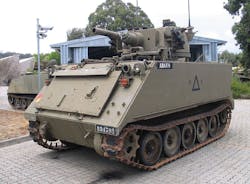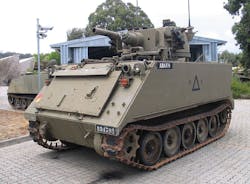Army wants armored combat vehicle to demonstrate unmanned technologies
PICATINNY ARSENAL, N.J. — U.S. Army armored combat vehicle experts are making plans to ask industry for military vehicle prototypes to demonstrate promising enabling technologies for a future generation of tracked unmanned combat vehicles.
An unmanned version of the Army M113 armored personnel carrier is expected to demonstrate promising enabling technologies for a future generation of heavy tracked unmanned combat vehicles.
Officials of the Army Contracting Command at Picatinny Arsenal, N.J., announced their intention (W15QKN-17-Z-021X) to issue a request for prototype proposals (RPP) for the Combat Vehicle Robotics (CoVeR) program. The Army Contracting Command issued the RPP on behalf of the Army Tank Automotive Research Development and Engineering Center (TARDEC) in Warren, Mich.
The upcoming CoVeR request for prototypes will be issued to the National Center for Manufacturing Sciences (NCMS) in Ann Arbor, Mich., which will make the RPP available to members of the National Advanced Mobility Consortium (NAMC) in Warren, Mich.
The Army’s CoVeR program seeks to develop autonomous vehicle mobility technologies to enable military tracked autonomous vehicles to operate in tough military environments at realistic speeds.
CoVeR is developing technologies that enable scalable integration of multi-domain robotic and autonomous systems, and is expected to develop foundational technologies for weaponized robotic platforms.
CoVeR is an outgrowth of the Army’s Wingman Joint Capability Test Demonstration, which applied autonomous technologies to Army unmanned Humvee wheeled combat vehicles.
The ultimate goal is to enable soldiers of the future to team up with new kinds of robotic battlefield vehicles that will allow for increased stand-off between themselves and enemy forces.
The Wingman project involved autonomous Humvees equipped with 7.62-millimeter machine guns. The project demonstrated the ability for soldiers to pilot these armed autonomous Humvees, and shoot the vehicles’ machine guns accurately.
The Wingman Humvees use the Robotic Technology Kernel, a TARDEC-developed autonomy system with driving cameras, sensors, and other electronics that give the unmanned vehicles teleoperated or autonomous operation.
The Wingman Humvees also use the Autonomous Remote Engagement System that reduces the time necessary to identify targets using vision-based automatic target detection and userspecified target selection.
Technologies developed for Wingman will feed into the CoVeR program, which will use larger combat vehicles for manned and unmanned teaming. These new autonomous technologies may enable the future soldier to manage several different unmanned combat and reconnaissance vehicles, as well as unmanned aircraft.
E-mail questions or concerns to the Army’s Sean McAvoy at [email protected]. For additional information, contact the National Advanced Mobility Consortium online at www.namconsortium.org, or the National Center for Manufacturing Sciences at www.ncms.org.
More information on the upcoming CoVeR request for prototypes is online at https://www.fbo.gov/notices/7545bb865da5b8057f1855d6bf5fad9b.

